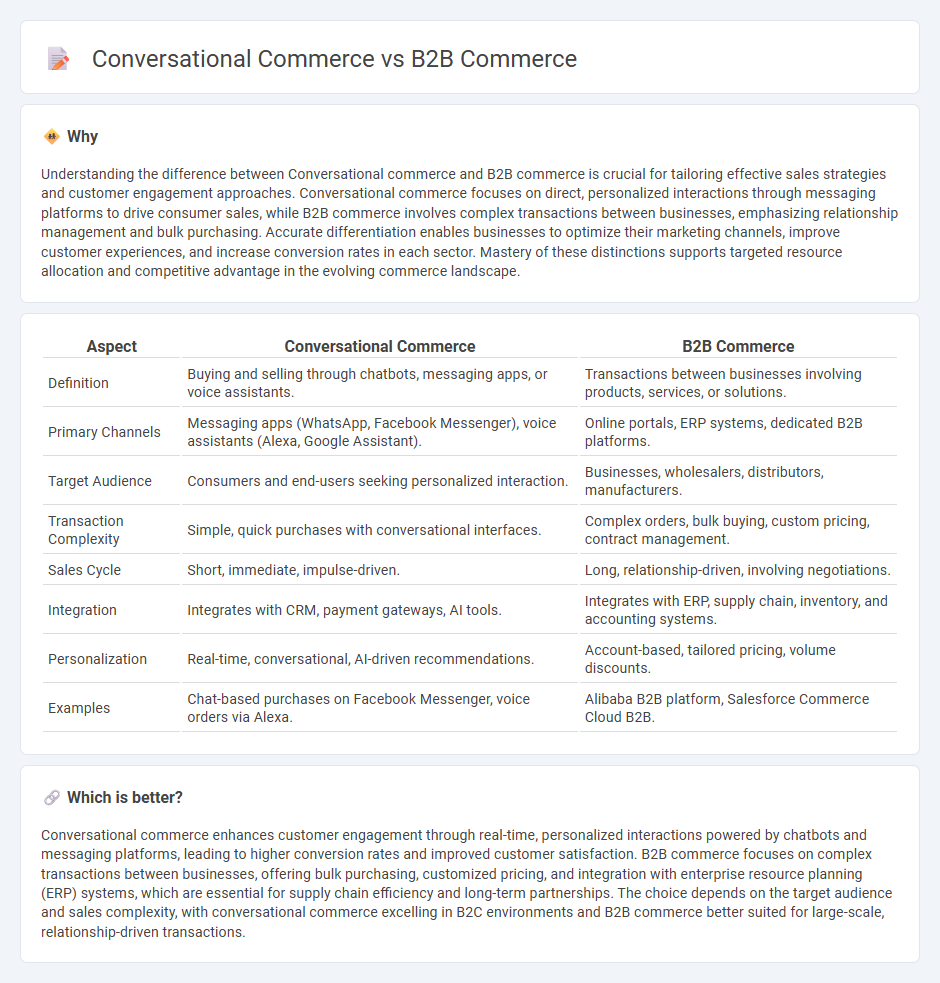
Conversational commerce leverages AI-driven chatbots and messaging platforms to facilitate real-time, personalized customer interactions that simplify purchasing processes and boost engagement. B2B commerce focuses on complex transactions between businesses, emphasizing bulk orders, customized pricing, and long-term relationships supported by integrated ERP and CRM systems. Explore the evolving dynamics and benefits of these commerce models to optimize your business strategy.
Why it is important
Understanding the difference between Conversational commerce and B2B commerce is crucial for tailoring effective sales strategies and customer engagement approaches. Conversational commerce focuses on direct, personalized interactions through messaging platforms to drive consumer sales, while B2B commerce involves complex transactions between businesses, emphasizing relationship management and bulk purchasing. Accurate differentiation enables businesses to optimize their marketing channels, improve customer experiences, and increase conversion rates in each sector. Mastery of these distinctions supports targeted resource allocation and competitive advantage in the evolving commerce landscape.
Comparison Table
| Aspect | Conversational Commerce | B2B Commerce |
|---|---|---|
| Definition | Buying and selling through chatbots, messaging apps, or voice assistants. | Transactions between businesses involving products, services, or solutions. |
| Primary Channels | Messaging apps (WhatsApp, Facebook Messenger), voice assistants (Alexa, Google Assistant). | Online portals, ERP systems, dedicated B2B platforms. |
| Target Audience | Consumers and end-users seeking personalized interaction. | Businesses, wholesalers, distributors, manufacturers. |
| Transaction Complexity | Simple, quick purchases with conversational interfaces. | Complex orders, bulk buying, custom pricing, contract management. |
| Sales Cycle | Short, immediate, impulse-driven. | Long, relationship-driven, involving negotiations. |
| Integration | Integrates with CRM, payment gateways, AI tools. | Integrates with ERP, supply chain, inventory, and accounting systems. |
| Personalization | Real-time, conversational, AI-driven recommendations. | Account-based, tailored pricing, volume discounts. |
| Examples | Chat-based purchases on Facebook Messenger, voice orders via Alexa. | Alibaba B2B platform, Salesforce Commerce Cloud B2B. |
Which is better?
Conversational commerce enhances customer engagement through real-time, personalized interactions powered by chatbots and messaging platforms, leading to higher conversion rates and improved customer satisfaction. B2B commerce focuses on complex transactions between businesses, offering bulk purchasing, customized pricing, and integration with enterprise resource planning (ERP) systems, which are essential for supply chain efficiency and long-term partnerships. The choice depends on the target audience and sales complexity, with conversational commerce excelling in B2C environments and B2B commerce better suited for large-scale, relationship-driven transactions.
Connection
Conversational commerce enhances B2B commerce by enabling real-time, personalized interactions between businesses through chatbots and messaging platforms, streamlining sales and procurement processes. This integration boosts customer engagement, accelerates decision-making, and reduces transaction friction within B2B marketplaces. Leveraging AI-driven conversational tools supports complex B2B buying cycles by providing immediate product information, quotes, and support, driving efficiency and satisfaction.
Key Terms
Supply Chain (B2B commerce)
B2B commerce streamlines supply chain operations by integrating advanced procurement platforms, enabling real-time inventory management and automated order processing, which significantly reduces lead times and operational costs. Conversational commerce, while enhancing customer interactions through AI-driven chatbots and voice assistants, primarily focuses on customer engagement rather than direct supply chain optimization. Explore how these distinct approaches transform supply chain efficiency and customer experience in modern trade.
Chatbots (Conversational commerce)
B2B commerce involves bulk transactions and long-term contracts between businesses, emphasizing detailed product catalogs and complex order management systems. Conversational commerce leverages chatbots to provide real-time, personalized customer support and streamline buying processes through natural language interaction, enhancing customer engagement and satisfaction. Discover how integrating chatbot technology can revolutionize your B2B sales strategy and improve operational efficiency.
Procurement (B2B commerce)
B2B commerce in procurement emphasizes streamlined supplier interactions, bulk ordering capabilities, and integration with ERP systems to enhance purchasing efficiency. Conversational commerce leverages AI-driven chatbots and messaging platforms to facilitate real-time negotiation, order customization, and instant support within procurement processes. Explore how these approaches transform procurement workflows and optimize supplier relationships.
Source and External Links
What Is B2B Ecommerce? Examples and How to Start - B2B ecommerce is the online process of a business marketing and selling products or services to other businesses, enabling expanded reach, reduced costs, automated sales, and streamlined ordering with high growth potential in a digital marketplace.
What is B2B commerce? - B2B commerce is the buying and selling of goods or services online between businesses, supported by specialized ecommerce platforms that cater to business-specific needs like recurring payments and custom pricing.
What Is B2B Ecommerce? A Complete Guide - B2B ecommerce involves complex, bulk transactions between businesses requiring personalized pricing and tailored online storefronts for efficient order management and enhanced buyer relationships.
 dowidth.com
dowidth.com